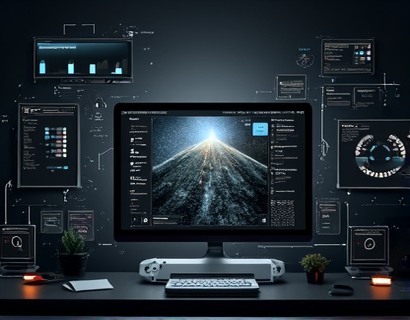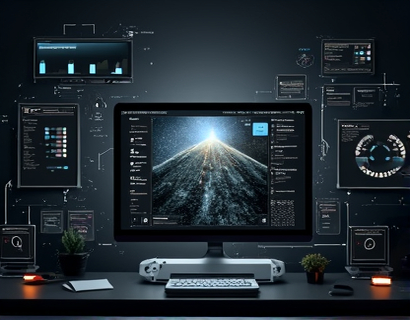AI-Driven Life Management: Unlocking Productivity and Personal Growth
In the fast-paced world of today, managing personal and professional life efficiently is more crucial than ever. The integration of Artificial Intelligence (AI) into life management tools offers a revolutionary approach to enhancing productivity and fostering personal growth. An AI-driven personal assistant serves as a sophisticated tool, providing intelligent insights and tailored guidance to simplify decision-making and boost efficiency. This advanced technology streamlines task management, acting as a trusted companion in navigating daily challenges, ultimately helping individuals optimize their lives through innovative solutions.
The concept of an AI-driven life management system is rooted in the ability to analyze vast amounts of data, learn from patterns, and offer personalized recommendations. Such a system can integrate with various aspects of daily life, from scheduling and task management to financial planning and health monitoring. By leveraging machine learning algorithms, these tools become more accurate and effective over time, adapting to the user's unique needs and preferences.
Enhancing Decision-Making with Intelligent Insights
One of the primary benefits of an AI-driven personal assistant is its capacity to provide intelligent insights that aid in decision-making. By processing information from multiple sources, the AI can offer data-driven suggestions that consider various factors and potential outcomes. This capability is particularly useful in complex scenarios where human decision-making might be clouded by bias or limited information.
For instance, when planning a project, the AI can analyze past performance data, market trends, and resource availability to suggest the most efficient approach. It can also highlight potential risks and propose mitigation strategies, ensuring that decisions are well-informed and robust. This level of support not only saves time but also enhances the quality of decisions, leading to better outcomes in both personal and professional contexts.
Streamlining Task Management
Effective task management is a cornerstone of productivity, and an AI-driven assistant excels in this area. By integrating with calendars, to-do lists, and other productivity tools, the AI can create a comprehensive overview of daily, weekly, and monthly tasks. It can prioritize tasks based on urgency and importance, ensuring that critical activities receive the necessary attention.
The AI can also automate routine tasks, such as setting reminders, scheduling appointments, and sending notifications. This automation reduces the cognitive load on the user, allowing them to focus on more strategic and creative work. Additionally, the AI can identify patterns in task completion and suggest optimizations, such as batch processing similar tasks or delegating responsibilities to others when appropriate.
Personalized Guidance for Continuous Improvement
Personal growth is a lifelong journey, and an AI-driven personal assistant can play a significant role in this process. By continuously monitoring progress and providing personalized feedback, the AI helps users identify areas for improvement and develop strategies to overcome challenges. This guidance is tailored to the individual's goals, learning style, and current capabilities, ensuring that the advice is relevant and actionable.
For example, if a user is working on improving their time management skills, the AI can track their daily activities and offer insights into time-wasting habits. It can then suggest practical techniques, such as the Pomodoro Technique or time blocking, and provide step-by-step instructions on how to implement these methods. Over time, the AI can adjust its recommendations based on the user's progress, ensuring a continuous cycle of learning and improvement.
Tailored Recommendations for Optimal Performance
One of the most powerful features of an AI-driven life management tool is its ability to provide tailored recommendations. By analyzing a wide range of data points, including personal preferences, work style, and environmental factors, the AI can offer customized suggestions that enhance performance and well-being. These recommendations can cover various aspects of life, from diet and exercise to stress management and sleep optimization.
For instance, the AI might analyze a user's sleep patterns and suggest adjustments to their bedtime routine to improve sleep quality. It could recommend specific relaxation techniques, such as deep breathing exercises or meditation, based on the user's stress levels and preferences. Similarly, the AI can suggest meal plans and workout routines that align with the user's health goals and lifestyle, making it easier to maintain a balanced and healthy lifestyle.
Building Habits for Long-Term Success
Habits play a crucial role in achieving long-term success, and an AI-driven personal assistant can be a valuable ally in habit formation. By setting clear goals and providing structured support, the AI helps users develop consistent routines that lead to lasting change. The AI can create habit tracking systems, offering reminders and motivational messages to keep users on track.
For example, if a user aims to start a daily meditation practice, the AI can set a specific time each day for meditation, send gentle reminders, and track progress over time. It can also analyze the user's adherence to the habit and provide insights into factors that may be influencing their success or challenges. Based on this data, the AI can suggest adjustments to the routine, such as changing the time of day or incorporating additional supportive activities.
Enhancing Professional Development
In the professional realm, an AI-driven personal assistant can significantly enhance career growth and job satisfaction. By analyzing job market trends, skill requirements, and personal strengths, the AI can offer strategic advice on career development. This includes recommendations for further education, skill acquisition, and networking opportunities.
For instance, the AI might identify emerging industries or roles that align with the user's interests and skills, providing detailed information on the required qualifications and potential career paths. It can also suggest online courses, workshops, or certifications to help the user acquire the necessary skills. Additionally, the AI can assist in building a professional network by recommending relevant events, conferences, or online communities.
Managing Stress and Promoting Well-Being
Stress management is an essential component of personal and professional success, and an AI-driven personal assistant can offer valuable tools and strategies to promote well-being. By monitoring stress levels and identifying triggers, the AI can provide personalized recommendations for stress reduction, such as mindfulness exercises, physical activity, or time management techniques.
For example, if the AI detects a spike in stress levels, it might suggest a short mindfulness session or a brief walk to help the user relax. It can also track the user's mental health over time, offering insights into patterns and suggesting long-term strategies for maintaining balance. By integrating these tools into daily life, users can better manage stress and improve their overall well-being.
Integration with Smart Home Devices
The convenience of an AI-driven personal assistant extends beyond digital tasks to physical environments, particularly when integrated with smart home devices. By controlling lighting, temperature, and entertainment systems, the AI can create a comfortable and efficient living space that adapts to the user's preferences and needs.
For instance, the AI can adjust the lighting and temperature to optimize conditions for work or relaxation, based on the user's activities and preferences. It can also automate routines, such as turning off lights and locking doors when leaving the house, enhancing security and convenience. This level of integration not only simplifies daily tasks but also contributes to a more sustainable and energy-efficient lifestyle.
Overcoming Common Challenges
While the benefits of an AI-driven personal assistant are numerous, there are common challenges that users may face. One potential issue is the initial setup and integration with existing systems, which can be complex for some users. To address this, it is essential to provide clear, step-by-step guides and customer support to ensure a smooth onboarding process.
Another challenge is the concern over privacy and data security. Users must be assured that their personal data is handled with the highest level of security and compliance with privacy regulations. Transparent policies and robust security measures are crucial in building trust and encouraging adoption.
Additionally, some users may be skeptical about relying on AI for critical decisions. To mitigate this, the AI should be designed to augment human decision-making rather than replace it. Providing explanations for recommendations and allowing users to override suggestions can help maintain a balanced approach.
Conclusion
AI-driven life management tools represent a significant advancement in personal and professional productivity. By offering intelligent insights and tailored guidance, these assistants simplify decision-making, streamline task management, and promote continuous personal growth. As technology continues to evolve, the potential for AI to enhance our lives becomes increasingly vast, making it an invaluable resource for individuals seeking to optimize their daily experiences and achieve their goals.










































